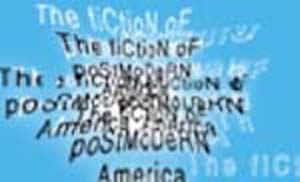COURSE DESCRIPTION:
The course title is meant to suggest both a subject matter (postmodern American fiction) and a problem (that the concept of postmodernism is itself a fiction). While there is a body of literature and criticism that is often identified as "postmodern," that concept like all critical concepts is merely a device that allows us to see some aspects of a text while obscuring others. And in this case the concept itself is a notoriously slippery one whose meaning is hotly contested. This class will look at various attempts to define "postmodernity" (as general social condition) and "postmodernism" (as aesthetic ideology & cutltural style). We will also look at various efforts to constitute a "poetics" of postmodern fiction. Throughout we will be evaluating the usefulness of these notions as tools for reading contemporary American fiction. We will look at a range of texts, some closely identified with postmodernism, some not generally considered postmodern, in an effort to understand the uses and limits of the categories.
We will look at these texts in an effort to explore the specific, varied qualities of recent American fiction and the specific varied qualities of our own (perhaps) postmodern lives. In particular we will examine the uneven effects of postmodernity and the variety of postmodernisms as shaped by differences in race, ethnicity, class, sexuality, gender, and region (in this regard the question of what constitutes "America" also will be seen as a critical issue).I will designate this array of socially constructed differences through the shorthand terms "multicultural" and "intercultural." The former term means to stress the semi-autonomy of various USA cultures, the latter term to stress their inevitable, power-laden interdependence as sub-cultures woven into a fabric of domination and resistance.
